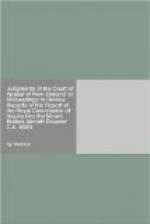We do not overlook that the cases just cited were concerned with the scope of questions that might be put to witnesses under compulsory powers given by statute. They were not directly concerned with the scope of findings in reports. But if the Court has jurisdiction to determine the true scope of a Commission’s inquiry and require the Commission to keep within that scope there are obvious arguments that it should have a corresponding jurisdiction in the matter of findings. A vital part of the constitutional role of the Courts is to ensure that all public authorities, whether they derive their powers from statute or the prerogative, act within the limits of those powers.
A different view was taken by Stephen J. sitting at first instance in chambers in R. v. Collins (1976) 8 A.L.R. 691, but we note the opinion expressed in several Canadian cases that the Court will intervene where a Commissioner has inquired or seeks to inquire into matters outside his terms of reference: Re Sedlmayr (1978) 82 D.L.R. (3d.) 161; Re Anderson (1978) 82 D.L.R. (3d.) 706; Landreville v. The Queen (1973) 41 D.L.R. (3d.) 574; Landreville v. The Queen (No. 2) (1977) 75 D.L.R. (3d.) 380, 400-402.
In Re Royal Commission on Thomas Case (1980) 1 N.Z.L.R. 602 a Full Court (Molier, Holland and Thorp JJ.) held inter alia that the Court may prohibit a Commission from acting in excess of its jurisdiction and that the creation of a Commission pursuant to the Letters Patent does not exempt it from the supervisory role of the Court. However part of the Full Court’s decision in that case is the subject of a pending appeal to this Court and other proceedings relating to the Thomas Commission have been moved into this Court. So we refrain from expressing any final view upon it.
For the foregoing reasons we think that if the applicants make out their claim that the findings of the Erebus Commission in paragraph 377 are outside the commissioner’s terms of reference, they could be granted a declaration to that effect at common law. To obtain a setting aside of the findings under s. 4 (2) of the Judicature Amendment Act 1977 they have to show in addition that the findings were made in the exercise of a statutory power of decision. We think this requirement should not present final difficulty if regard is had to the evident intent and spirit of the 1972 Act and particularly the amendments made by Parliament in 1977.




